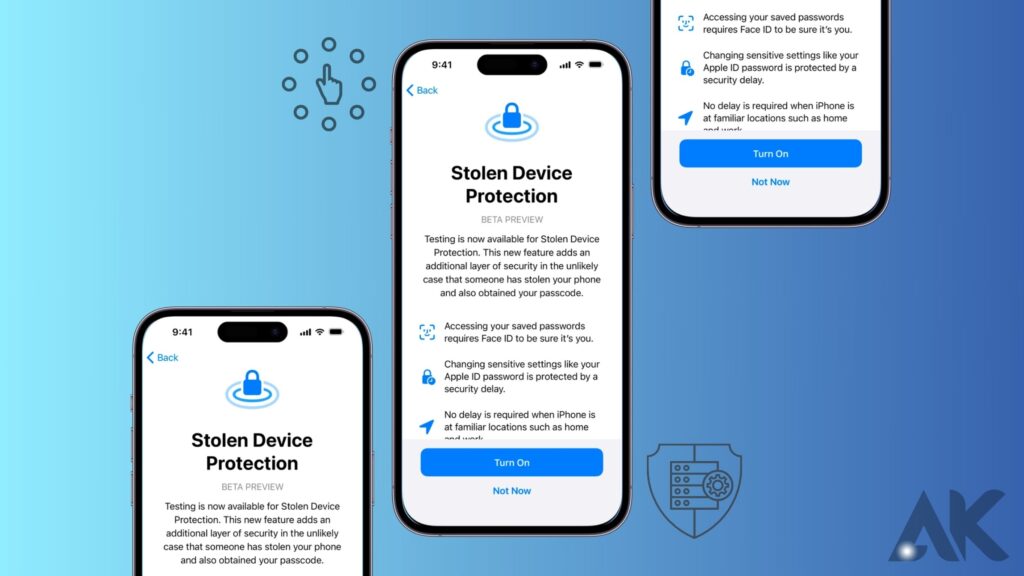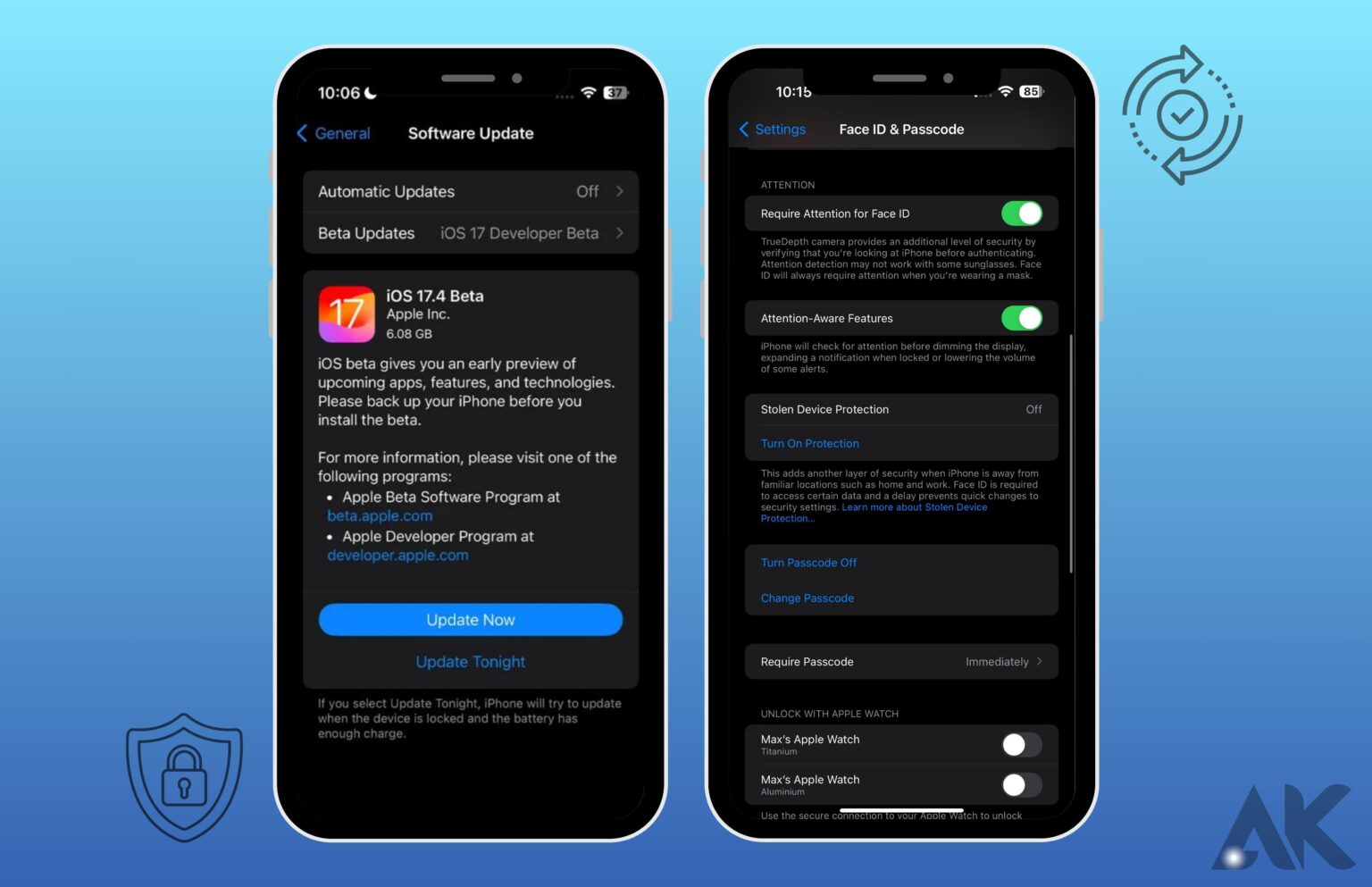The latest version of iOS, 17.4, marks a significant step forward in the constantly changing world of digital privacy by including several strong privacy enhancements that strengthen user protection. This new version of Apple’s OS explores novel ways to fortify protections against possible privacy breaches and to give users more agency over their data. With iOS 17.4, users will have more control and visibility over their digital footprint thanks to improved tracking controls and more sophisticated app permissions.
Stolen Device Protection Options

Apple added several additional customization options to Stolen Device Protection in iOS 17.4. With the new settings, you may decide if a one-hour security delay is required whenever you wish to access specific settings or make changes, or if you simply want the delay while you’re in a familiar place, like your home. With the release of iOS 17.3, Apple included a new function called Lost Device Protection. The idea behind this feature is to safeguard some of your data if your device is lost or compromised. Apple still suggests that everyone activate the function, even though it doesn’t completely safeguard your data.
Siri can send messages in multiple languages.

Apple enabled Siri to convey messages in multiple languages with the first beta of iOS 17.4. The option to Message with Siri, which was previously known as Automatically Send Messages, is now located in Settings > Siri & Search. You can add a new language by tapping the Messaging with Siri icon. Selecting this option will allow Siri to communicate with you in a variety of languages, including Arabic, Spanish, and Thai. According to Apple, Siri can also read messages in the languages listed here; however, selecting a language from this list will not alter Siri’s default listening and responding language. Siri was formerly limited to sending messages in English exclusively.
The first beta version of iOS 17.4 will include these and other improvements for developers and testers. However, this in no way guarantees that these improvements will remain in the final version of iOS or that they are the only ones on the horizon for iOS 17.4. There is currently no confirmed release date for iOS 17.4, although Apple has hinted that March could be a possible month.
What the iPhone Update That Changed Everything Does to Spotify
In early March, Apple will release iOS 17.4, a major update for the iPhone. Among the new and improved features is Apple’s intention to adhere to the Digital Markets Act, a new rule in the European Union that will be in force in March, which is why the company is updating at this time. While the United States may not immediately feel all of these effects, that may change in the future if the federal government decides to follow the European Union’s example. All 27 member states of the European Union will be affected.
To comply with EU law, Apple is attempting to secure the iPhone against malware and other security concerns while also opening up the software to external app stores. Spotify is among the app developers who have spoken out against the modifications, labeling them as “extortion.” Who or what is telling the truth? Developers already pay Apple a cut of any app sales or in-app purchases of digital products and services made through the app.
Several businesses voiced their displeasure with the DMA, including Spotify, which in 2019 challenged Apple for antitrust violations and characterized the commission as a tax. According to Spotify, Apple’s new regulations are equal to pressure. The world’s most popular music streaming app, Spotify, is one of the developers that Apple is proud to back, according to a statement from the tech company. New alternatives for distributing iOS apps and processing payments are available to developers thanks to the updates we’re publishing for apps in the EU.
Any developer is free to continue using the current conditions if they so desire. More than 99 percent of developers would end up paying Apple the same amount or less under the new terms. Just so you know, in 2016, Spotify stopped taking premium subscriptions to the app so they could avoid paying Apple a percentage. It also invited users to re-register using a different payment method outside the app in July 2023, when it downgraded all premium subscribers to the free, ad-supported service.
As a result, Spotify is currently not compensating Apple for allowing the software to be available in the iPhone software store. To have their apps included in the App Store, developers of free apps do not pay anything to Apple. This is a brilliant strategy for reaching a massive audience, given that there are one billion iPhones in circulation. Spotify dominates the massive and rapidly expanding streaming service industry.
The DMA’s necessary modifications are complicated, and you may find more information about them here. However, the Core Technology Fee is the area where it has the greatest impact on businesses like Spotify. As a result of the new regulations, alternative app markets will be available in the European Union. These markets provide the option to accept several forms of payment. Despite not paying Apple a commission on sales, they will pay the CTF ($0.54, 0.5€).
Once the software reaches 1 million installs, that fee is paid on the first install of each year. You won’t have to pay anything if your program achieves 999,999 installs; however, if it receives 1,000,001 downloads in a year, Apple will want 0.5€. So, why all the excitement? Sure enough, you’ll start shelling out serious dough after you hit 200 million downloads (Spotify has more subscribers than that).
Spotify will keep paying nothing if it opts to maintain the current terms. Its desire to provide its users with the most convenient method of upgrading to premium—the ability to sign up and pay within the app—is understandable, though. That can be accomplished, for instance, by paying the commission Apple demands under the present terms or by paying the CTF under the new terms.
The company claims that protecting customers’ personal information is its top priority. Maintaining the App Store’s high level of security does not come cheap for Apple. Apple may believe that developers such as Spotify are seeking access to the massive iPhone audience without acknowledging or compensating for the value it offers.
Conclusion
Apple’s iOS 17.4 update aims to enhance user security and control over personal data. It introduces new options in Stolen Device Protection, allowing users to choose whether to require a one-hour security delay to access settings or make changes. Siri can now send messages in multiple languages, including Arabic, Spanish, and Thai. However, some app developers, like Spotify, have criticized the changes as “extortion.” The Digital Markets Act, which comes into effect in March, affects all 27 countries in the EU, and Apple’s response is to open up the iPhone software to external app marketplaces while keeping the iPhone safe from malware and other security issues.
FAQS
Can you tell if someone is remotely accessing your iPhone?
Signs of iPhone remote access
Someone may have gained access to a user’s phone and compromised their accounts if they suddenly changed their password. Get in touch with customer service so they can check your credentials and account status if you find out someone changed your password or if you’re unable to access any of your accounts.
What are the iOS privacy settings?
Customize your privacy settings. You can manage which applications can access your device’s storage by adjusting the privacy settings in iOS and iPadOS. To take a picture and then post it to a social media app, for instance, you might authorize the app to use your camera.

